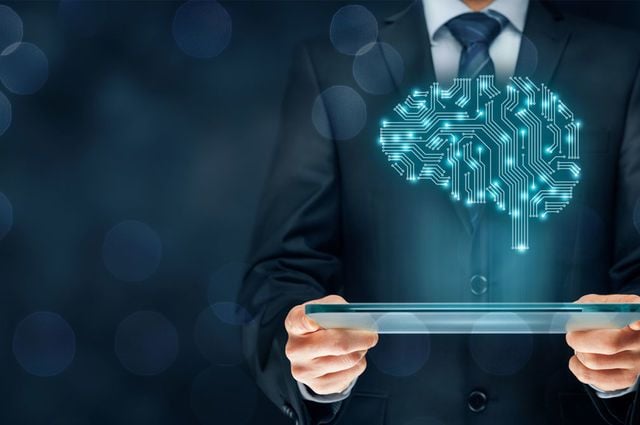Artificial Intelligence… Where could and should AI be adopted in our industry?
15 experts shared their view
Artificial intelligence is rapidly moving from the laboratory and into business and consumer applications. The result is a fundamental shift in how software is built, and what it's capable of doing. And while we're still a way off from the artificial general intelligence portrayed in the movies, artificial narrow intelligence is a reality that's already powering some of the most successful technology businesses today, including Amazon, Facebook, Google and Apple.
So… Which areas of the hospitality industry are and will be most suited to implement AI and why? What's your take?
It is not up to the industry to decide whether to embrace next-gen technologies, including AI, or not. The marketplace itself, severe labor shortage, cost efficiencies and the rising tide of digitally-obsessed travel consumers are demanding that our industry overcome its glaring technology deficiencies and imposing on our industry the rapid adoption of next-gen technologies.
Hoteliers need to embrace, learn about, and invest in the next-gen technologies that are already making their way into hospitality, including Artificial Intelligence (AI), Internet of Things (IoT ), Voice Assistants, Chat Bots, Robotics and Automation.
All of these technologies and applications have one thing in common: they are powered by AI and over the next 3-5 years we will witness wider adoption and implementation of the following:
- Robotics and Automation: Labor-intensive hotel positions that involve repetitive or structured work such as housekeeping, customer service and call center reps, and F&B waiting staff will see wider adoption of robotics, automation, and other AI-powered devices in the years to come. Robots will replace jobs around the property, from front desk and housekeeping to kitchen staff.
- Chatbots and self-service kiosks will solve high costs and labor shortage in customer service and many guest-facing positions;
- AI-powered CMS, CRM and RMS will turn one-to-one marketing and one-to-one/dynamic pricing into established best practices;
- database management (single-view customer data) and loyalty programs.
- Voice Assistants/Voice Search: Integration of major hotel brand CRS with voice assistants like Amazon Alexa, Google Assistant and Apple Home Pod, customer service (voice assistants in hotel rooms).
- Internet of Things (IoT): Customer service (concierge, hotel lobby, room service);hotel security, operations (power, A/C management, lighting, etc.)
By AI I think we typically refer to ML (Machine Learning). ML could be leveraged in various aspects - yielding by anticipating guest arrival/departure times, anticipating guest requests, even planning/anticipating staff capacity. The issue, as always, is the data - integrations between hospitality systems are still not universal, data is still siloed, and the quality of the data itself is generally low due to human error which should be compensated for, but is generally magnified by complex and difficult-to-use technology platforms. This means that while ML could benefit the industry, the data infrastructure within hospitality companies required to realize these benefits is 'not quite there' yet.
It may be time to stop asking where we “could or should” be adopting Artificial Intelligence. 'Should' is off the table because AI technology is becoming so pervasive and meaningful that we can't afford to ignore its capabilities. Chat-bots are an excellent example of what deep-learning applications can do; humans will soon stop asking other humans for information or assistance just as we've stopped asking for driving directions.
'Could' is a limitless universe of possibility. We 'could' be using AI anywhere it makes budgetary sense, and the frequency of those opportunities will only continue to rise as AI technology mainstreams and becomes more affordable than human labor. But let's dismiss the showy humanoid robotics – right now those are just attention grabbers for beginners and conspicuous consumers. I believe, however, that housekeeping carts will be filling the service requests for soap, shampoo and clean towels.
For my money, AI's 'killer app' would be something like “Amazon Travel.” (Jeff Bezos: call me!) For the near term, AI will be less about robotics and more about matching preferences with opportunities: aligning age, budget, available time, health, physicality, lifestyle, affinity groups, friends, social circles, travel history and life experience goals with events you may not even know are taking place. After all, you don't know who and what you don't know – and there is no better way to fix that than by applying a thousand terabytes of artificial intelligence.
Even though still in the Buzz word stage, AI will play a massive role in our industry. Most will state that it will be a customer facing technology. From concierge robots who can interact with guests to chatbots and messaging. While these are a great use of the technology where I believe it can have the biggest impact is data analysis. Being able to take all the customer reviews, surveys, online comments, and social media postings and being able to create understandable and actionable items from the system that hotels can improve their service offering or better understand their customers to drive better performance will be where this technology should have its place in our industry.
Revenue management systems (RMS) were once amongst the hottest technologies in our industry. Unfortunately, we have not made much progress beyond hurdle rates, last room availability and length of stay powered by basic algorithms that haven't changed much. AI is offering a great opportunity to make those platforms quicker and better. When we combine CRM and RMS systems we have the ability to personalize offers and to yield on individuals instead of room inventory alone.
If we add attribute based selling to the mix and also yield on room attributes (a balcony or a double bed for example), a simple algorithm will not suffice anymore.
Instead, we will need agile processes that can adjust based on many changing factors instantly; the perfect job for an AI engine!
And a great opportunity for RMS systems to become a 'hot' technology once again.
Artificial Intelligence is not new to the hospitality industry in the specifics of narrow intelligence. The industry has long had technology capable of providing decision support or executive information around specific and targeted sets of consolidated information. The main example is what we today know as revenue management systems.
The various company's that have provided software solutions for this domain of expertise have combined information about the future, information about the past and then algorithms against this information to determine the future state of reservation and booking behavior to forecast lead time and make pricing recommendations.
Revenue Management technology has been in our market for more than 20 years. Curiously, for a part of the business so fundamental to operational success the adoption of revenue management technology for all its capability has been slow. Many questioning the application of the science, data and the outcome of the algorithms. Great resistance has been faced by industry technology providers. iDeaS recent study on adoption statistics support the phenomena.
I wonder if as a result of the buzz around 'Artificial Intelligence' across technology in general, the road will be smoothed for greater adoption of the tool.
As for the future, decision support can play a part in so many facets of the industry. My top 3 areas of opportunity are;
1. Revenue Management technology will continue their early work and with access to deeper information will apply forecast and pricing optimization across the business, having an impact on all perishable products and services. Eventually to the level of individual pricing for a single guest for a variety of specific or combined products.
2. The stand out opportunity is profile information. Capturing behavioral information about individual guests in relation to personal details and preferences as well as purchasing behavior is also old. The best operators have structured themselves to cater to the guest on an individual level through manual research of information on hand in various systems on and above property. 3 day and pre-arrival review and loyalty operations being manual examples of this effort. The next step will be the automatic analysis and presentation of this information as well as recommendations for personalization. As staffing decreases in operational positions, this capability will be the difference between blanket standard treatment and genuine individual recognition.
3. An area of large cost to industry is supply chain. Today's smart operators adopt integrated supply chain solutions with a direct real-time link to consumption of goods, using transactions and par stock settings to automate the generation of orders. The next step will combine transactional information with buying behavior of mass and individual guests discussed in 2. above to shorten the supply chain, ensure fresher product, more quickly consumed and lower shelf and storage cost of supplies. Overall the guest experience will be improved and the cost of stock on hand will be drastically reduced, eliminating wastage in the supply process, further supporting pricing and profitability described in 1. above.
In general look to the large cost areas and potential for increased profitability as the immediate targets for AI.
Research has repeatedly shown that consumers want to have engaging, relevant experiences. In fact, 61% of consumers are more likely to buy from companies that deliver custom content based on real-time interaction. First, in this age of convergence, the traditional lines between marketing, revenue management, loyalty and distribution are becoming blurred. Hilton has publicly stated it collects one billion guest-related data points every day. AI needs a lot of data to be collected, and the industry is finally able to do so. AI-powered dynamic engagement recommendation and conversion engines are emerging which proactively determine what and how to offer a guest based on reams of data collected.
Second, the industry is a prime candidate for the Internet of Things (IoT). When more and more devices in a hotel exchange more and more bits and bytes, AI will be able to proactively understand how to optimize a hotel's entire ecosystem, from queue management to food purchasing to vastly increasing energy efficiency and reducing costs. In the next few years, we will see the emergence of “analytics on the edge,” with a real-time stream of decisions being made not in central data centers, but within smart devices themselves.
AI is already being leveraged in many hotels, from online concierge and chatbot systems, to sophisticated revenue management and yielding platforms. An area of great potential for AI is in a space where guests are already accustomed to using it at home...with voice controlled digital assistants such as Alexa and Google. As hotel rooms become more sophisticated with complex lighting arrangements, mechanical curtains, connected temperature controlling, music, and TV systems, it becomes much easier and intuitive for the guest to use their voice to control the room. Voice controlled assistants powered by AI bring a simple user interface to connect many systems...just like at home.
AI is a popular subject at the Royal Institution where I'm a patron and it is the World's oldest science charity (set up by Michael Faraday in 1799) and it is based in Albemarle St in Piccadilly. The Ri run low-cost talks aimed at a non-techy audience and often get great speakers in who explain complex subjects very clearly. More here if anyone is interested: https://www.rigb.org/
Prof Chris Bishop who heads up Artificial Intelligence (AI) in Microsoft's Cambridge Labs is a regular presenter. The Ri captures all of the talks on their YouTube channel and this one by Chris as an introduction to AI is well worth a watch.
https://www.youtube.com/watch?v=8FHBh_OmdsM
There are many buzzwords in this area including Artificial Intelligence, Augmented Intelligence, Machine Learning, Neural Nets etc, but Chris explains them all very well. Basically, AI is the broad subject of machines doing tasks that we would consider smart. Machine Learning is a subset of AI and is where we give machines some clever algorithms (rules) and lot of data and let them spot patterns and deduce findings for themselves. A Neural Net is a computer system designed to work by classifying information in the same way a human brain does. They work on probability and feedback, and a lot of trial and error. Augmented Intelligence is man and machine working in concert eg a surgeon might use AI to review thousands of cat scans but use his/her personal experience to decide next steps on any exceptional cases.
AI has been with us for some time and it's behind the collaborative filtering used by Amazon, Spotify, Netflix and other retailers, to match new products with current likes or purchases.
Where is AI in hospitality? Currently, a lot of work is happening in Revenue Management to optimise pricing in ways that humans couldn't begin to do manually. Some general hospitality examples: https://www.revfine.com/artificial-intelligence-hospitality-industry/
Also, AI is behind the various chatbots that are appearing eg The Radisson's Edward agent: https://www.forbes.com/sites/janetwburns/2016/05/10/radisson-blu-hotel-guests-can-now-text-edward-the-chatbot-for-service/#5b208401e23c
AI will have a great future in hospitality where pattern recognition within big data sets is needed, which will include understanding guest preferences and recommending future stays and linked experiences.
To me AI is no “panacea” that will solve all challenges in our industry – AI is a scientific discipline (like mathematics or biology) meaning that AI is nothing more than an array of concepts and methods to solve problems. Alan Turing once said, that “anything that can be computed (…) can be automated!”. AI aided business processes in the hospitality industry are therefore plenty to aim for in my opinion:
From more simplistic number-crunching via already existing behavioural-analyses (for recommendation and up-sell) to image & voice processing (for arrival and in-house management) all the way to autonomous service & cleaning robots.
Autonomy (the ability to perform tasks without constant guidance by a user) and Adaptivity (the capability to improve by learning from experience) are in my opinion key to the success of an AI supported business process in the hospitality (and any other) industry.
But, at the end of the day the customer will decide how much AI (s)he likes to encounter in the digital guest journey of the future.
AI is a very exciting topic with many seeing it as the most impactful emerging technology. I think the most exciting use of the technology will be in the improved efficiency and success of forecasting. Being able to draw from data of both internal and external sources will allow us to paint a more accurate picture of how changes in the environment impact the business. Taking over some of the more data driven tasks will allow our experts to focus on the application of the forecast and changes that will have positive impacts on the business.
In its current form, AI is best suited to take over repetitive tasks and/or make use of large amounts of data. AI will, therefore, touch many areas of the hospitality industry in the near future. For example, hotels could use AI at the front desk to automate mundane chores like check-in, check out, payments, or task management. Or hotels could use AI in sales and marketing to intelligently upsell, cross-sell, personalize communications, or customize its website based on a guest's profile or behavior. Revenue managers will also make use of AI to intelligently (and automatically) set pricing and build out attribute-based pricing models.
In reality, the current proven use cases for hotels are rather limited at this point and time, and we believe that the above ideas are just a starting point.
We do have more additional viewpoints on what is going to happen on the AI front so watch out on some articles to be published soon.
Several years ago I remember watching the Jeopardy episode(s) where IBM's “Watson” played against human opponents and beat former champs Ken Jennings and Brad Rutter. That was my first insight into the possibility of what AI could do. Now AI capabilities are quite common in chatbots and responses for text messaging platforms. This helps frees up human manpower (away from transactional type questions) to spend more quality time engaging with guests and shaping more memorable guest experiences.
But chat is not the only thing out there that can be done with AI. I also believe that AI will help to re-shape revenue management. AI has the ability to process massive amounts of data in a fraction of second and provide logical suggestions/recommendations. Enter the RMS. If a hotel could harness all of the shopping queries from GDS, IBE, OTA (demand data) as well as competitors rate, PACE and budget and then make rate recommendations for each day of the week and update multiple times per day - this would have a significant impact on increasing RevPAR. Now we're talking a real impact on revenues.
Where I don't see AI functioning is in face to face interaction. While robots delivering towels to a room is “novel” it is not a replacement for human to human contact. A Japanese hotel brand tried to roll out robot front desk agents and the number of issues and complaints that spawned from this experiment hurt the idea of what “self-service” should look like. In the end, the hospitality business is still a human to human experience and AI needs to be weaved into the fabric of the total guest experience.
In my 30+ years in the travel and hospitality technology sector I've not seen anything with the promise of revolutionizing the guest experience quite like natural language processing - the technology behind popular voice assistants like Amazon's Alexa, Google Assistant, and IBM Watson, among others. Like other popular consumer technologies, voice assistants require a technology overlay to achieve the business objectives of hoteliers and meet the demands of complex integrated hotel environments.
There are four primary challenges facing hotel technology decision makers considering voice technologies:
- Protecting Guest Privacy in the face of a live microphone
- Securely Integrating Existing Technologies while Protecting Proprietary Data Assets
- Improving the Accuracy of Voice-Based Interactions as the failure rates in homes just won't meet the high bar of the hospitality industry
- Flexibly Managing Multiple Natural Language Processing Platforms Across a Global Portfolio while Maintaining Brand Consistency
The major voice technology platforms differentiate themselves based on price, language, data sharing, data protection, and customizability, among other features. Be sure you select the voice technologies best suited for each of your individual properties while managing all from a single easy to use cloud-based conversation management tool. Ensuring that you are using voice technologies to meet your business objectives - whether driving more efficient guest service, influencing your guests' behavior, improving net promoter scores or understanding your guests better - without being beholden to any single provider of natural language processing technology.
The keyword here is personalization. When applying AI to the interaction between hospitality brands and travelers, we can arrive at Predictive Personalization: understanding user behavior to predict how to best serve him so that we increase both user satisfaction and hotel revenue. By focusing on a narrow, industry-specific use of machine learning, it's possible to create predictive algorithms and offer completely new, powerful targeting options like buying intent or user value, and even attempt to find the holy grail of e-commerce: personalized price.
















